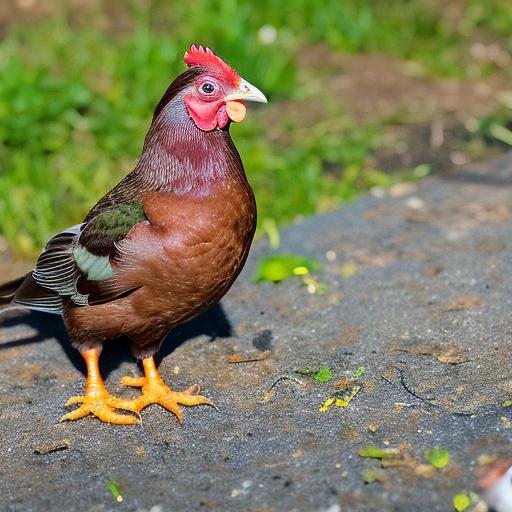Keeping chickens in an urban environment like Jersey City may seem like an unconventional choice, but it has become increasingly popular in recent years. There are several benefits to raising chickens in the city, including access to fresh eggs, natural pest control, and the opportunity to connect with nature in a bustling urban setting.
As a resident of Jersey City, I have personally experienced the joys of raising chickens in my backyard. Not only do they provide me with delicious eggs every day, but they also bring a sense of tranquility and connection to the natural world that is often lacking in city life. In this article, I will share my insights and knowledge about keeping chickens in Jersey City, including local laws and regulations, choosing the right breed, housing requirements, feeding and nutrition, health care, managing noise and odor issues, and the overall benefits of keeping chickens in an urban environment.
Key Takeaways
- Keeping chickens in Jersey City is a growing trend among urban residents.
- Local laws and regulations must be followed when raising chickens in Jersey City.
- Certain breeds of chickens are better suited for urban living than others.
- Proper housing and coop requirements are necessary for the health and safety of Jersey City chickens.
- Providing a balanced diet and veterinary care is essential for the well-being of urban chickens.
Local Laws and Regulations for Raising Chickens in Jersey City
Before embarking on your chicken-keeping journey in Jersey City, it is important to familiarize yourself with the local laws and regulations regarding chicken ownership. In Jersey City, residents are allowed to keep up to six hens (no roosters) on their property. However, there are certain requirements that must be met in order to legally keep chickens.
Firstly, you will need to obtain a permit from the Department of Health and Human Services. This permit requires an inspection of your property to ensure that it meets the necessary requirements for keeping chickens. These requirements include having a secure coop and run area that is at least 10 square feet per chicken, as well as proper waste management systems to prevent odor issues.
Additionally, it is important to be a considerate neighbor when keeping chickens in an urban environment. This means minimizing noise and odor issues associated with chicken ownership. It is also recommended to inform your neighbors about your plans to keep chickens and address any concerns they may have.
Choosing the Right Breed of Chicken for Urban Living
When it comes to choosing the right breed of chicken for urban living in Jersey City, there are several factors to consider. Firstly, you will want to choose a breed that is known for being quiet and docile, as this will help minimize noise issues in your neighborhood. Some breeds that are well-suited for urban environments include the Rhode Island Red, Australorp, and Sussex.
Another important factor to consider is the size of the breed. Since space may be limited in an urban backyard, it is best to choose a smaller breed that does not require as much space to roam. Bantam breeds, such as Silkies or Polish, are popular choices for urban chicken keepers due to their small size.
Lastly, it is important to consider the climate in Jersey City when choosing a breed. Some breeds are better suited for colder climates, while others thrive in warmer temperatures. It is best to choose a breed that is adaptable to the local climate to ensure the health and well-being of your chickens.
Housing and Coop Requirements for Jersey City Chickens
In order to comply with the regulations set forth by Jersey City, it is important to provide proper housing and coop requirements for your chickens. The coop should be secure and predator-proof, with a solid floor and walls that are at least 2 feet high. It should also have proper ventilation to prevent moisture buildup and ensure good air circulation.
The coop should provide at least 10 square feet of space per chicken, both inside and outside in the run area. The run area should be securely fenced to prevent escape and protect your chickens from predators. It is also important to provide nesting boxes for your hens to lay their eggs, as well as perches for them to roost on at night.
When building or purchasing a coop for your Jersey City chickens, it is important to ensure that it meets the city’s regulations. The coop should be located at least 10 feet from any neighboring property lines and should not be visible from the street. It is also important to keep the coop clean and well-maintained to prevent odor issues.
Feeding and Nutrition for Jersey City Chickens
Proper feeding and nutrition are essential for the health and well-being of your Jersey City chickens. Chickens require a balanced diet that includes a combination of grains, protein, fruits, vegetables, and calcium. A commercial layer feed is a good base for their diet, as it provides the necessary nutrients for egg production.
In addition to their regular feed, chickens also enjoy foraging for insects and vegetation in their environment. This natural behavior not only provides mental stimulation but also helps control pests in your backyard. It is important to provide a safe and pesticide-free environment for your chickens to forage in.
It is also important to provide fresh water at all times for your chickens. Chickens require clean water to stay hydrated and maintain their overall health. It is recommended to use a waterer that prevents spillage and contamination.
Health and Veterinary Care for Urban Chickens

Just like any other pet, urban chickens may face certain health issues that require veterinary care. It is important to find a veterinarian who specializes in chicken care and can provide the necessary vaccinations, treatments, and advice to keep your chickens healthy.
Common health issues that urban chickens may face include respiratory infections, parasites, egg-laying problems, and injuries. Regular health checks are important to catch any potential issues early on and prevent them from spreading to the rest of your flock.
In addition to veterinary care, it is important to practice good biosecurity measures to prevent the spread of diseases. This includes keeping your coop clean and free of waste, quarantining new chickens before introducing them to your flock, and practicing good hygiene when handling your chickens.
Managing Noise and Odor Issues with Jersey City Chickens
One of the concerns that neighbors may have when it comes to chicken ownership in an urban environment is noise and odor issues. However, with proper management and consideration, these issues can be minimized.
To minimize noise issues, it is best to choose quiet breeds and avoid keeping roosters, as they are the main source of noise. Additionally, providing a well-insulated coop and keeping your chickens entertained with toys and treats can help reduce boredom and excessive noise.
Odor issues can be managed by properly managing waste and keeping the coop clean. Regularly cleaning out the coop and run area, as well as using absorbent bedding materials, can help prevent odor buildup. It is also important to properly compost chicken waste to minimize odor and create nutrient-rich compost for your garden.
Being a considerate neighbor is also important when it comes to managing noise and odor issues. Informing your neighbors about your plans to keep chickens, addressing any concerns they may have, and taking steps to minimize noise and odor can help maintain positive relationships within your community.
Benefits of Keeping Chickens in an Urban Environment
Keeping chickens in an urban environment like Jersey City offers several benefits. Firstly, having access to fresh eggs is a major advantage. Fresh eggs from backyard chickens are not only delicious but also more nutritious than store-bought eggs. They are higher in omega-3 fatty acids, vitamin E, and beta-carotene.
Another benefit of keeping chickens in an urban environment is natural pest control. Chickens love to forage for insects and other pests in their environment, helping to keep your backyard free of pests like slugs, snails, and ticks. This natural pest control can reduce the need for chemical pesticides in your garden.
Additionally, keeping chickens in an urban environment provides an opportunity to connect with nature and experience the joys of raising animals. Chickens are fascinating creatures with unique personalities, and caring for them can be a rewarding and educational experience for both children and adults.
Tips for Raising Happy and Healthy Chickens in Jersey City
To ensure that your Jersey City chickens are happy and healthy, there are several tips to keep in mind. Firstly, providing a safe and comfortable environment is essential. This includes a secure coop and run area, proper ventilation, clean bedding, and access to fresh water and nutritious food.
It is also important to provide mental stimulation for your chickens. This can be done by providing toys, treats, and opportunities for foraging in their environment. Chickens enjoy scratching the ground, dust bathing, and exploring their surroundings.
Regular health checks and veterinary care are also important for maintaining the health of your chickens. This includes vaccinations, parasite prevention, and regular monitoring of their overall well-being.
Lastly, spending time with your chickens and building a bond with them is important for their socialization and well-being. Chickens are social animals that enjoy human interaction. Spending time with them, talking to them, and even hand-feeding them treats can help build trust and create a positive relationship.
Is Keeping Chickens in Jersey City Right for You?
Keeping chickens in Jersey City can be a rewarding and enjoyable experience. From the benefits of fresh eggs and natural pest control to the opportunity to connect with nature in an urban environment, there are many reasons why chicken ownership may be a good fit for you.
However, it is important to consider the local laws and regulations, as well as the responsibilities that come with owning chickens. Providing proper housing, feeding, health care, and managing noise and odor issues are all important aspects of responsible chicken ownership.
If you have the time, space, and commitment to provide a safe and comfortable environment for your chickens, keeping chickens in Jersey City can be a wonderful addition to your urban lifestyle. The joys of fresh eggs, the satisfaction of self-sufficiency, and the connection to nature are all within reach when you embark on the journey of raising chickens in the city.
If you’re considering keeping chickens in Jersey City, you may be wondering how big your coop needs to be to provide a comfortable living space for your feathered friends. Luckily, Poultry Wizard has an informative article that answers this very question. Their article titled “How Big Does a Coop Need to Be for a Chicken?” provides valuable insights and guidelines on the ideal coop size based on the number of chickens you plan to keep. Whether you’re a beginner or an experienced chicken keeper, this article will help you create a suitable and spacious home for your flock. Check it out here!
FAQs
What are the regulations for keeping chickens in Jersey City?
According to Jersey City’s municipal code, residents are allowed to keep up to six chickens on their property as long as they meet certain requirements, such as providing adequate shelter, fencing, and waste management.
Do I need a permit to keep chickens in Jersey City?
Yes, residents must obtain a permit from the Jersey City Health Department before keeping chickens on their property. The permit requires an inspection of the property to ensure it meets the necessary requirements.
What are the benefits of keeping chickens in Jersey City?
Keeping chickens can provide a source of fresh eggs, natural pest control, and fertilizer for gardens. It can also be a fun and educational experience for families and children.
What are the potential drawbacks of keeping chickens in Jersey City?
Chickens can be noisy and may disturb neighbors, and their waste can create unpleasant odors if not properly managed. Additionally, chickens can attract predators such as raccoons and foxes.
What should I consider before keeping chickens in Jersey City?
Before keeping chickens, residents should consider their property size, zoning regulations, and proximity to neighbors. They should also research the necessary care and maintenance required for keeping chickens, including feeding, cleaning, and providing adequate shelter.
Meet Walter, the feathered-friend fanatic of Florida! Nestled in the sunshine state, Walter struts through life with his feathered companions, clucking his way to happiness. With a coop that’s fancier than a five-star hotel, he’s the Don Juan of the chicken world. When he’s not teaching his hens to do the cha-cha, you’ll find him in a heated debate with his prized rooster, Sir Clucks-a-Lot. Walter’s poultry passion is no yolk; he’s the sunny-side-up guy you never knew you needed in your flock of friends!







